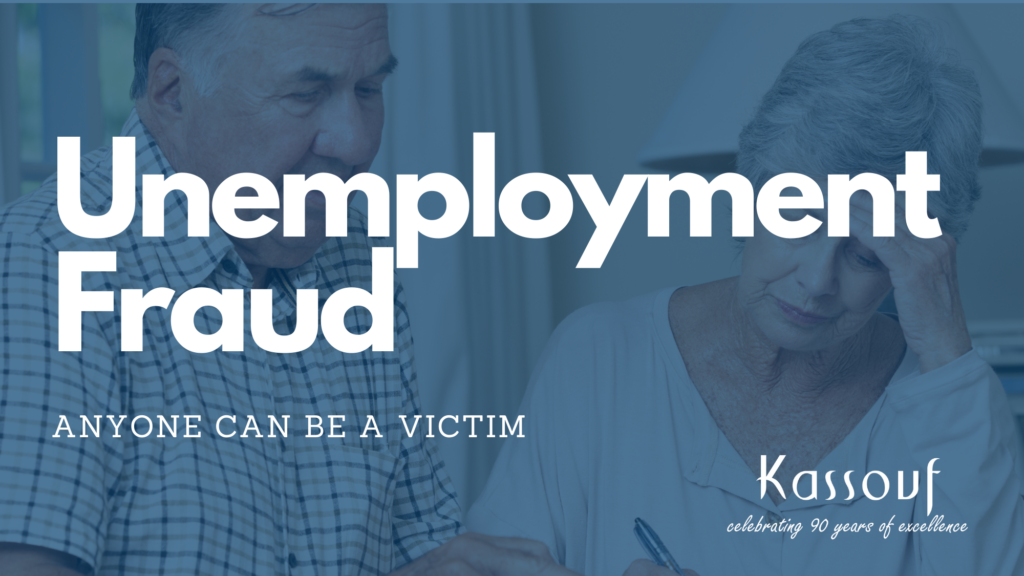
Anyone can be at risk of unemployment fraud. The growing problem has affected businesses, individuals, and even retirees in the past year. Unemployment fraud in the U.S. has reached dramatic levels during the pandemic. The Labor Department Inspector General’s Office estimates that more than $63 billion has been paid out improperly through fraud or errors since March 2020.
Unfortunately, most people do not know they’re a victim until the crime is completed. Fraud may have been perpetrated months ago, but some people may just be finding out because of tax season.
You could be a victim of unemployment fraud if…
- You’ve received benefits-related paperwork in the mail, but you haven’t filed an unemployment claim.
- An employer calls to verify a claim, but you haven’t filed for unemployment.
- You received a 1099-G tax form for benefits you never claimed.
- The IRS reports that you did not file all your income after completing your federal taxes.
- You attempt to file a legitimate claim, but your benefits are denied.
- The Social Security Administration reports that your benefits are being reduced.
If you or someone you know is a victim of unemployment fraud, follow these steps:
- Report suspected Unemployment (UI) Benefit Fraud with the state where the fraudulent claim was made.
Alabama Department of Labor
Other States - Place a fraud alert on your credit reports and review reports regularly. You can access your free credit report here. Credit bureaus to use for placing alerts:
Equifax, 888-548-7878
Experian, 888-397-3742
TransUnion, 800-680-7289 - Check any accounts that may have been opened without your permission; close accounts you know or believe to have been tampered with or opened fraudulently.
- File a complaint with the Federal Trade Commission (FTC) online or call 1-877-438-4338.
- File a report with the National Center for Disaster Fraud online or call 1-866-720-5721.
- File a police report. Obtain a copy of the report to submit to creditors and others that require proof of crime.
City of Birmingham, 205-328-9311
City of Mountain Brook, 205-802-2414
City of Homewood, 205-332-6200
City of Vestavia Hills, 205-978-0140
City of Hoover, 205-822-5300
Jefferson County, 205-325-5700
Shelby County, 205-670-6000
Businesses can also be victims of unemployment fraud. Take these steps to protect your business:
- Enroll in email notifications of unemployment claims; do not rely solely on the U.S. Postal Service.
- Immediately report any claim that you believe is fraudulent per the instructions included with the notice that a claim has been filed on your company.
- If the claimant name is a current or former employee, notify the individual. They will need to take the steps outlined above.
IRS Guidance
Taxpayers do not need to file a Form 14039, an identity theft affidavit, with the IRS regarding an incorrect Form 1099-G. The identity theft affidavit should be filed only if the taxpayer’s e-filed return is rejected because a return using the same Social Security number already has been filed.
If taxpayers are concerned that their personal information has been stolen and they want to protect their identity when filing their federal tax return, they can request an Identity Protection Pin (IP PIN) from the IRS.
An Identity Protection PIN is a six-digit number that prevents someone else from filing a tax return using a taxpayer’s Social Security number. The IP PIN is known only to the taxpayer and the IRS, and this step helps the IRS verify the taxpayer’s identity when they file their electronic or paper tax return.
If a payor or a law enforcement agency determines based on all facts and circumstances that, payments made under an unemployment compensation program were not made to the individual under whose name the benefits were claimed due to identify theft, the payments should not be reported on Form 1099-G.
If payments made due to identity theft are mistakenly reported on Form 1099-G in the name of an identity theft victim, a corrected Form 1099-G reporting $0 should be issued to the identity theft victim and filed with the IRS as soon as possible after the error is discovered.
If you have any questions about unemployment fraud, please contact us.
